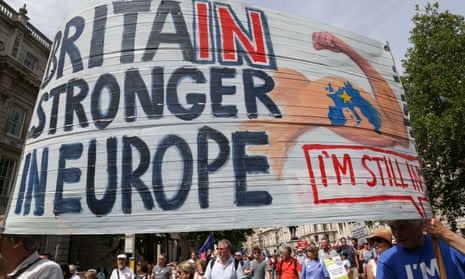Please, not again. Personally, the last thing I want is another EU referendum. But what I want is, of course, neither here nor there. What matters is that another popular vote will not be all its increasing number of supporters are cracking it up to be.
The latest and perhaps most high-profile interventions in favour of another vote came last week from Justine Greening. A few days later, the Economist, while recognising the problems in holding a second vote, argued that “a referendum would be [the] least bad” of the options currently available. And the argument has been taken up more recently in these pages by Vernon Bogdanor.
Obviously, a new referendum would pose a number of practical problems. Not least, as former Conservative party leader William Hague has pointed out, it would necessitate another act of parliament. Remember, the bill for the 2016 referendum took seven months to pass. Add the time required to designate the campaigns and hold the vote itself (and even allowing for “cutting and pasting” some of the parliamentary work from 2015 to speed things up), and it is clear that it would be difficult to have a result before the UK’s date of departure from the EU on 29 March 2019.
Yet put such practical arguments aside. Assume that, if need be, the EU would allow a pause in the article 50 process for us to hold a second vote. How would a new referendum be any different to the first? A number of different arguments have been advanced. These range from the claim that the facts have changed since 2016, to the assertion that a new referendum would be of a higher quality than the first because more facts are available, to Greening’s claim – reiterated by Bogdanor – that a “parliament in stalemate” cannot deliver Brexit.
But will the facts really be any clearer at the end of this year than they were in 2016? The Economist claimed that, this time round, the different alternatives available could be costed. But would clear alternatives really be available? And, given the nature of the Brexit debate, would it matter if they were, even if their implications could indeed be reliably modelled?
The answer to each of these questions is no. Any referendum held before the UK leaves the EU would not be held on a clear plan for future UK-EU relations. As the clock ticks down to the article 50 deadline, there are real doubts as to whether sufficient time remains to finalise even a withdrawal agreement, let alone a clear outline of a future relationship.
The best we can hope for on the latter is an aspirational political declaration with no legal force. Phrased as vaguely as the time constraints imply it must be, this will not provide a firm basis for informed debate. Instead, expect another campaign replete with competing claims about competing futures.
And this in a country where, as one observer has put it, we all now have our own facts anyway. Given the anger a second vote would generate amongst leave voters who would feel cheated, it is hard to see how calm and rational debate over empirical forecasts would be possible. And it’s worth emphasising just how profound the divisions in our country are. Sara Hobolt of the London School of Economics is doing some fascinating work on the cognitive biases induced by the 2016 vote, underlining how, post-referendum, UK citizens see politics through new “Brexit-tinted” lenses. These have served to bolster pre-existing attitudes on issues such as the economy and immigration. What are the odds a new vote will reverse or counteract this impact rather than reinforce it?
Finally, as far as the argument about a gridlocked parliament is concerned, the irony is that, on this at least, our representatives are indeed representative of the British people. Neither in Westminster nor among the public at large can a majority be found for any one Brexit outcome.
There would at least be a point to another vote if there was a realistic expectation that a clear majority could be found one way or another for a clear alternative. That might hold out the possibility of an outcome seen as legitimate.
But the polls reveal a public stubbornly divided, and, despite a shift towards a slight majority believing that the vote to leave was the wrong decision, the margin is small enough to prevent any certainty as to the outcome of any popular vote. Whatever the result, it seems unlikely to provide a significant majority either way.
A narrow victory for remain – the outcome which, let’s face it, most proponents of a second referendum desire – would solve none of the underlying problems that led to the Brexit vote in the first place. Rather, it would provide grist to the mill to opponents of the EU, and the establishment would be portrayed as having betrayed leave voters.
A semi-competent Ukip (far from guaranteed, admittedly) or even a new successor party would make hay in the 2019 European parliament elections. The Tories would remain as divided – probably even more so – as they were when David Cameron caved to pressure from Brexiters on his own benches and called the referendum in the first place. And leavers would continue to believe that warnings of dire consequences should we leave the EU were simply fictions. The divide in values in British society that burst into the open following the 2016 vote would remain entrenched, reinforcing the problems already faced by our party system in attempting to contain it.
Of course, things might change. An extension to the article 50 process, which prolongs British membership, may for example provide more time for a trade deal to be negotiated and hence the space for a more considered debate about a clearer set of alternatives. Yet the politics of the Conservative party militate strongly against such an outcome – at least for now.
And in the absence of such a development, the prospectus for a new vote is far from convincing. Removing the decision from the hands of deadlocked politicians to give it to a deadlocked public is no solution at all. Particularly as an already bitterly divided public would have no clear choice to vote on, no time for proper deliberation, and would remain as divided as they already are.
Another referendum, hurried through in the time available, would not be a higher-calibre version of the original. It would be a rerun, with arguments about an ill-defined future between camps who no longer listen to each other (insofar as they ever did). So, on reflection, please not again. For all our sakes.

